If you own an AR-style rifle that takes 5.56x45mm NATO ammunition (and its civilian equivalent, the .223 Remington), you may have come across green tipped ammunition. Known to the U.S. military as “M855,” you’ll find this hard, heavy ammo in affordable military surplus packages. If you come across a package of M855 green tipped ammo, should you make the purchase? If you do, how should you use these rounds? Whether you are a casual target shooter or a long-range hunter, you’ll find this ammo to be surprisingly useful and versatile.
Your Guide to 5.56 Green Tipped Ammo
What is 5.56 Green Tipped Ammo?
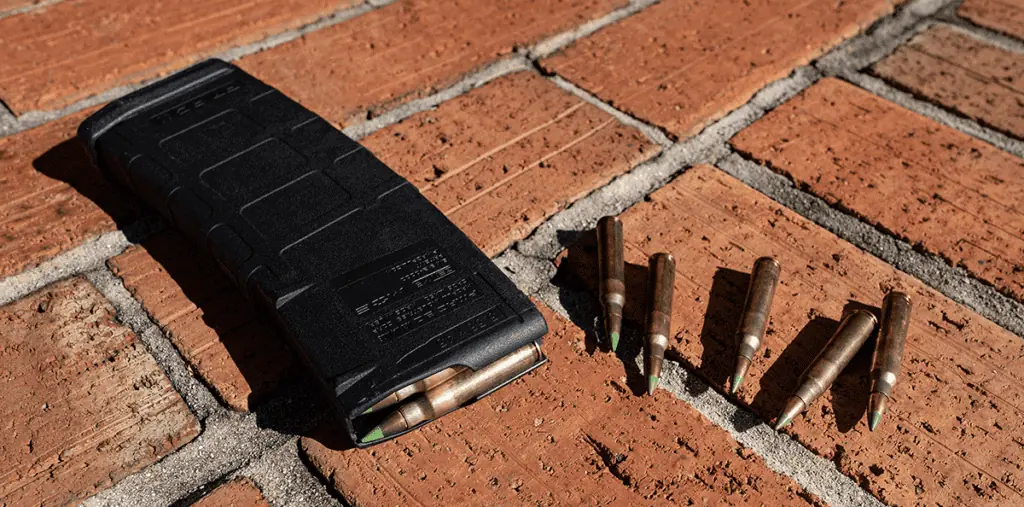
M855 ammo, often referred to simply as “green tipped” rounds, is one of the most common military surplus options available to AR-style gun owners. These 5.56x45mm rounds are similar to other rounds except for one factor: the bullet. The projectile is, essentially, the only significant difference between this and “standard” or “typical” 5.56 ammo. M855 uses a 62-grain bullet, which is heavier than the standard bullet weight of 55 grains. Not only is the bullet heavier, it is made from a partial steel core. This makes it much harder than a typical full-metal jacket round. A typical FMJ features a lead core wrapped in a copper jacket. To identify the ammo from other rounds, the bullet tips are painted green. Then, manufacturers sell these green tipped rounds to the public when there is more than enough to equip the military.
Is Green Tipped Ammo Legal?
The military designed green tip ammunition for maximum penetration. The government doesn’t classify the rounds as “armor piercing,” but they can deliver a powerful punch. For this reason, many gun-control advocates have made attempts to stop the sale of these rounds. Despite these efforts, green tipped ammo is legal to purchase and possess, although certain states have laws limiting who can own this type of cartridge. (Check your state laws before making the purchase.)
Green Tipped Ammo: A Ballistics Briefing
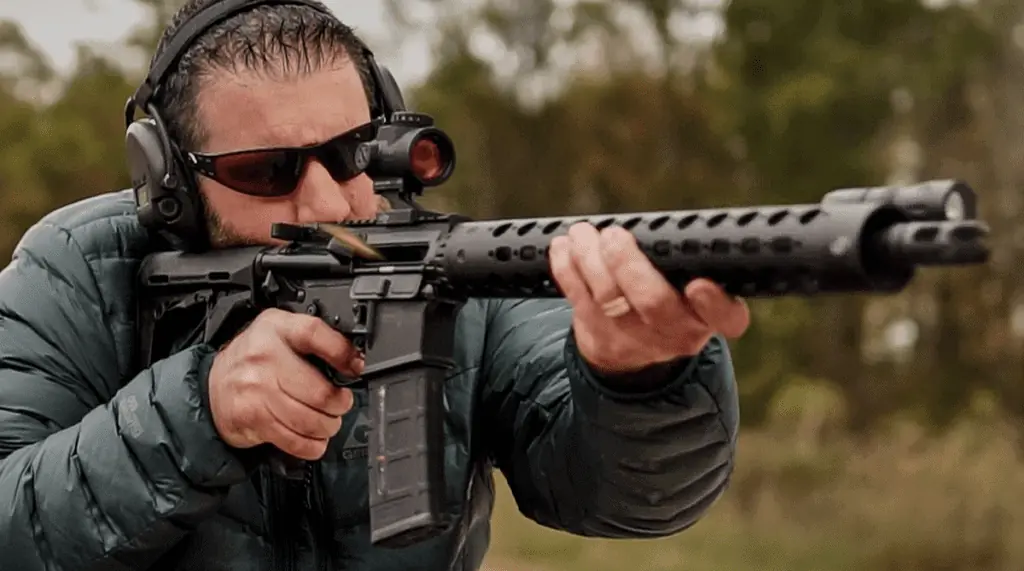
While ballistic stats such as velocity, energy, and trajectory can’t tell the entire story, they can help us understand the capability and performance of 5.56 green tipped rounds, especially how that performance compares to standard 55-grain FMJ rounds. Only a few manufacturers make 5.56mm rounds that are painted green and classified as M855. Other manufacturers may have 62-grain FMJ ammo in this cartridge, but they don’t qualify as M855 because they use a lead core and copper jacket instead of steel.
Winchester is probably the most common manufacturer of 5.56 green tipped ammo. Precision Made Cartridges (PMC) is another manufacturer, as is the Israeli Military Institute, or “IMI.” Since the IMI does not have manufacturer’s statistics (that we can find), we’ll look at the listed stats for M855 ammo made by Winchester and PMC, and compare that to a sample of 55-grain FMJ rounds. It’s a small sample size, but it will help us understand the capability of green tipped ammunition.
Velocity
| Muzzle (fps) | 200 yards | 400 yards | |
|---|---|---|---|
| Winchester M855 Ammo | 3,060 | 2,529 | 2,055 |
| PMC M855 Ammo | 3,100 | 2,449 | 1,885 |
| Winchester 55-grain FMJ | 3,180 | 2,425 | 1,943 |
| PMC 55-grain FMJ | 3,270 | 2,555 | 1,943 |
| Federal 55-grain FMJ (American Eagle) | 3,165 | 2,412 | 1,776 |
| Hornady 55-grain FMJ (Frontier) | 3,240 | 2,468 | 1,817 |
Judging by muzzle velocity, it appears the green-tipped ammo is a bit slower than many other rounds, but not by a significant margin. However, when the rounds start to approach 400 yards, they can be faster. This may be because the heavier round maintains momentum, allowing it to keep its speed at a greater distance.
| Muzzle (ft-lbs) | 200 yards | 400 yards | |
|---|---|---|---|
| Winchester M855 Ammo | 1,289 | 800 | 581 |
| PMC M855 Ammo | 1,323 | N/A | N/A |
| Winchester 55-grain FMJ | 1,235 | 718 | 390 |
| PMC 55-grain FMJ | 1,306 | N/A | N/A |
| Federal 55-grain FMJ (American Eagle) | 1,223 | 711 | 385 |
| Hornady 55-grain FMJ (Frontier) | 1,282 | 744 | 403 |
These energy statistics bring a bit more clarity. It would be helpful to have downrange energy on PMC’s green tip ammo, but we can still look at Winchester’s for the comparison.
Muzzle energy is not outstanding. It’s higher than some, lower than others, but never far apart. What is impressive is the energy at 400 yards. Winchester’s green tip ammo has an energy of 581 ft-lbs, while the rest hover around 400 ft-lbs. This suggests that it may be more capable as a long-range hunting tool, especially if penetration is important.
Trajectory
Trajectory may be the most difficult statistic to consider, mostly because manufacturers are inconsistent when providing these stats.
Let’s narrow our focus to the Winchester products, which provide information on rounds zeroed at 200 yards…
| Drop at 300 yards | Drop at 400 yards | Drop at 500 yards | |
|---|---|---|---|
| Winchester M855 Ammo | 7.5 inches | 22.9 | 49.4 |
| Winchester 55-grain FMJ | 9 inches | 26.7 inches | 55.3 inches |
PMC provides information for cartridges zeroed to 100 yards…
| Drop at 200 yards | Drop at 300 yards | Drop at 400 yards | |
|---|---|---|---|
| PMC M855 Ammo | 3.1 inches | 11.9 inches | 28.3 inches |
| PMC 55-grain FMJ | 2.6 | 10.6 | 25.6 |
In these comparisons, we don’t see results that lead us to any specific conclusion. One green tip ammo (Winchester) drops less that its partnering round, the other (PMC) drops more. This seems to suggest that green tip ammo probably doesn’t offer any significant improvement in overall accuracy compared to other products. In other words, you wouldn’t buy this round simply for the superior trajectory.
So…Why Green Tipped Ammo?
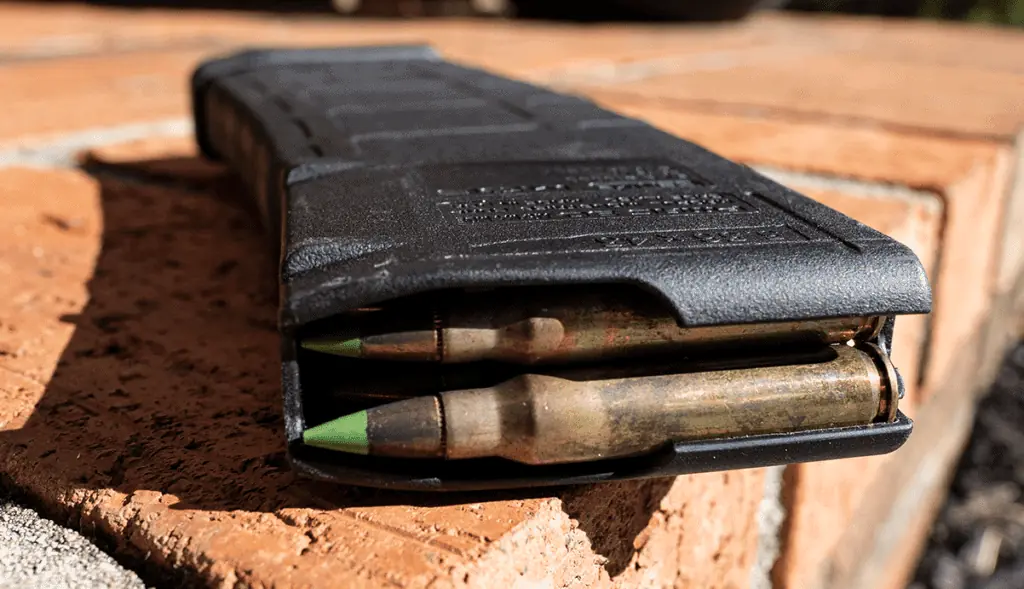
After all that, we come to the final thought: why purchase green tipped ammo? Why purchase a non-expanding, heavier round that offers better downrange energy but doesn’t provide a significant improvement on velocity or trajectory? For most hobby shooters, price is a big factor. Places like the Lake City Army Ammunition Plant make this ammunition large batches for military use. While the military uses most of the rounds, there is often overstock. To reduce surplus ammo, Lake City sells the cartridges, often at a price much lower than average. While green tipped ammo won’t be the lowest-cost 5.56x45mm round on the shelves, it’s certainly an affordable option. The rounds are also effective for long-range target shooting and you can use them for long-range hunting in certain situations. If you need penetration at a distance of 200, 300, or 400 yards, green tipped ammo may deliver quality results.

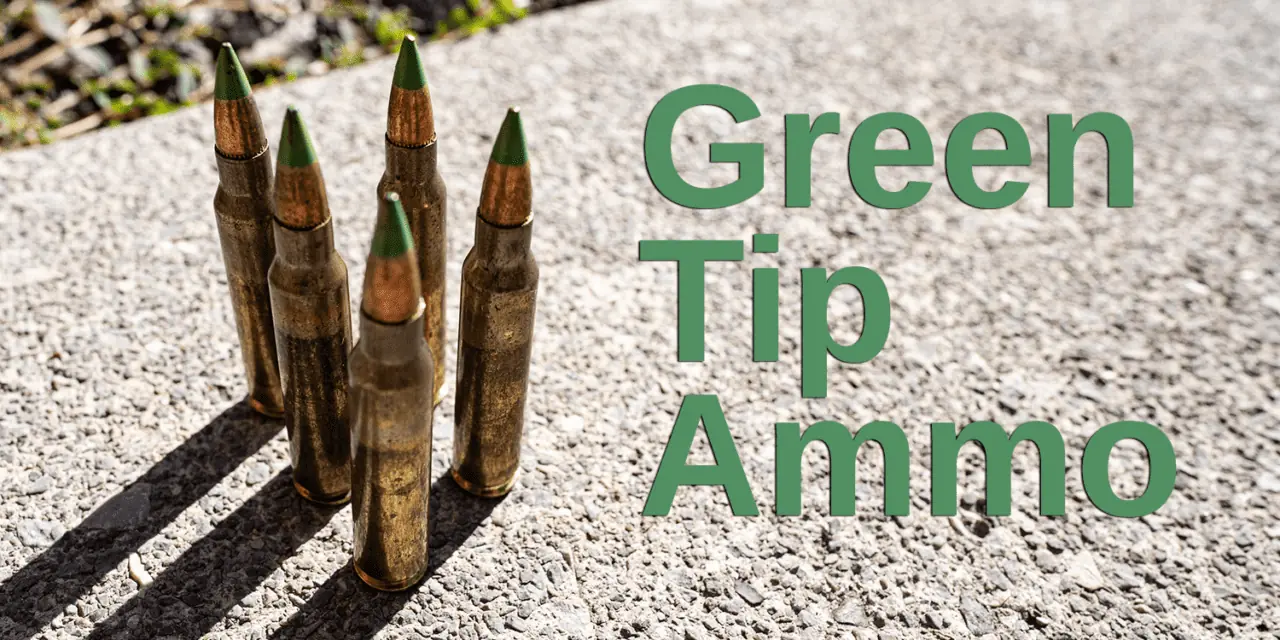

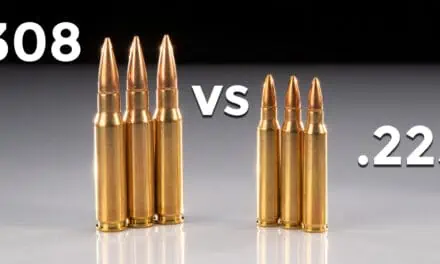
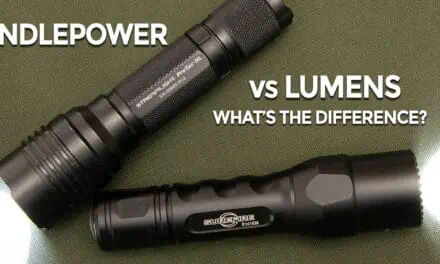
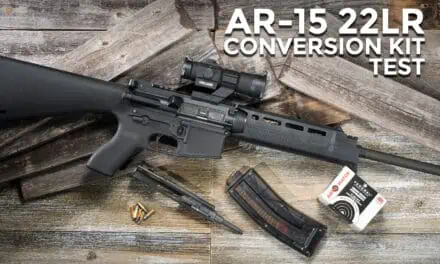
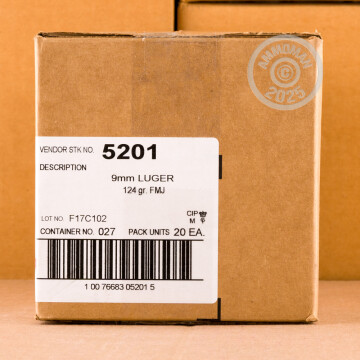
In my experience, some indoor ranges ban the use of green tip ammo.